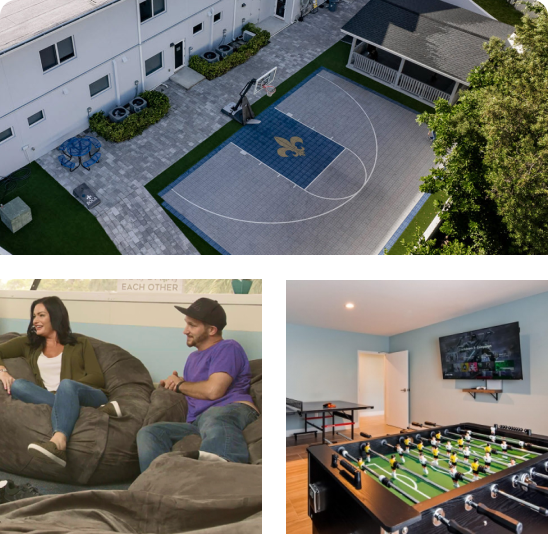 500+ 5-Star Reviews
500+ 5-Star Reviews 500+ 5-Star Reviews
500+ 5-Star Reviews
Dialectical Behavior Therapy
Dialectical behavior therapy (DBT) is a type of psychotherapy developed by Marsha Linehan in the late 1980s.[1] She envisioned it as a treatment for borderline personality disorder. But at Boca Recovery Center, we’ve used this therapy to help hundreds of people gain a deeper understanding of their addiction history and sober future.





Dialectical Behavior Therapy at Boca Recovery Center
Every person on the Boca Recovery Center staff is committed to using only science-based modalities to help people recover from substance use disorders (SUDs). DBT is one such proven therapy.
Researchers say DBT can help people with addictions improve their emotional control, reduce compulsive behaviors, and live healthier lives.[1] At Boca Recovery Center, DBT is part of a comprehensive program to help you gain control over an SUD.
Since 2016, Boca Recovery Center has provided safe, effective, medically proven treatment plans for people struggling with SUDs. Enroll in treatment, and you’ll spend every day using DBT and other science-based modalities to build the life you always wanted.

What to Expect
Evaluation
Your team will learn about your SUD and your past treatment attempts. We’ll also uncover underlying mental health issues that could complicate your recovery. With this information, we can plan the best therapeutic approach and choose therapy types.
Learning
DBT teaches people skills to cope with strong emotions, triggers, and cravings. But this therapy works best when it’s customized.
Your care team will learn more about your future plans, past struggles, and current triggers. That data helps us craft the best path forward.
Treatment
If DBT is right for you, treatment will consist of individual therapy, group training skills sessions, and phone coaching. Your treatment team will monitor your progress at every step, ensuring you get all you can out of this important recovery method. DBT will be used alongside other therapies to provide true wraparound care for SUD.
Benefits of Dialectical Behavior Therapy (DBT)
Only proven, science-based therapies are offered at Boca Recovery Center. DBT is one such treatment.
Researchers say it provides benefits, such as the following, to people in recovery:[1-3]
- Mindfulness - Learn how to be active in the present rather than dwelling on the past or worrying about the future.
- Interpersonal skill - Learn how to communicate clearly, listen carefully, and overcome conflicts with others.
- Emotional awareness - Identify and target difficult emotions and learn to shift them without abusing substances.
- Distress management - Get comfortable with uncomfortable thoughts and feelings, so you don’t try to medicate them with substances.
What Patients Say

Boca Recovery is one of the best treatment centers in South Florida to address your substance use! As a clinical staff member, I can genuinely say that each therapist working here has your best interests at heart. We will work beside you to help guide you towards a successful recovery!
Britt

Boca recovery housing was very comfortable for the time I spent there. The apartment has two bedrooms fully furnished with kitchen appliances and all the necessary items to cook meals every day. It definitely allowed me to transition back to reality very easily as I was attending groups and AA meetings every day. I enjoyed using the gym and basketball they provided. I would recommend to anyone.
Erik

"This is an awesome place where they really care about you! They really go out their way to help you, they are compassionate about what they do and today I can say thank you Boca for being there and being a big part of my recovery journey."
A.R
Why Choose Us?
Proven Success in Addiction Care
We’ve helped over 6,000 patients fight and overcome their addiction and we truly understand the level of care needed to achieve long-term sobriety.
World-Class Treatment & Staff
We have some of the best medical directors that focus on creating customizable treatment plans to help patients overcome addiction
Top 10% of Rehabs in the U.S.
Our industry accreditations put us as the top 10% of rehabs in the U.S.
Flexible Payment Options
Frequently Asked Questions
Dialectical behavior therapy (DBT) helps people struggling with substance use disorders learn new skills to solve the problems that are contributing to their addiction. These skills include distress tolerance, emotional regulation, interpersonal communication, and mindfulness.[1]
During a DBT session, the therapist helps individuals recovering from addiction to understand why they act in a specific way. The back-and-forth debate (dialectics) between a client and therapist allows those who abuse substances to examine their false beliefs and arrive at the truth.
Yes. Boca Recovery Center offers DBT as part of a science-based approach to SUD treatment. Counselors have extensive experience in providing this type of therapy to people in need.
- Dialectical behaviour therapy skills training for the treatment of addictive behaviours among individuals with alcohol use disorder: the effect of emotion regulation and experiential avoidance. Cavicchioli M, Ramella P, Vassena G, et al. The American Journal of Drug and Alcohol Abuse. 2020;46(3):368-384.
- Dialectical Behavior Therapy: Current indications and unique elements. Chapman AL. Psychiatry (Edgmont). 2006;3(9):62-68.
- Individuals who report having benefitted from dialectical behaviour therapy (DBT): a qualitative exploration of processes and experiences at long-term follow-up. Gillespie C, Murphy M, Kells M, Flynn D. Borderline Personality Disorder and Emotion Dysregulation. 2022;9:8.
